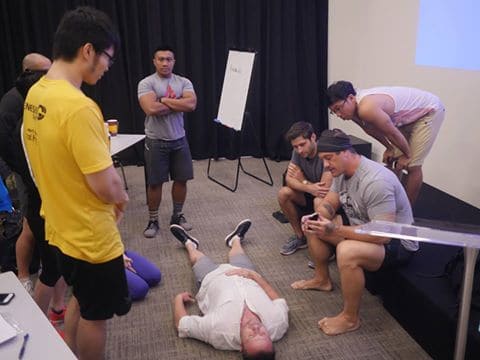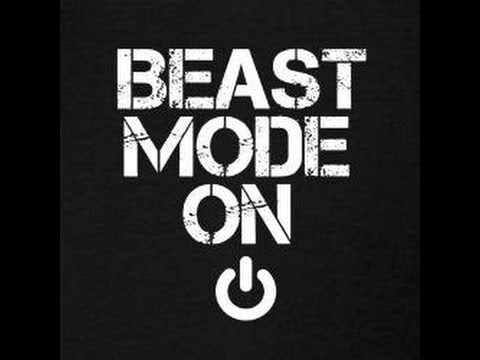By Coach Jen Lisheng, Genesis Gym Eunos HQ
Late in March, we had the great privilege of learning from Coach Luke Leaman and Zoe Night of Muscle Nerds. Anticipating it to be a highly useful course, the Genesis Team sent the senior coaching team to attend.

From left to right: Jonathan Wong (Genesis Gym Founder), Eleanor Tay (Genesis Gym, Raffles), Jen Lisheng (Genesis Gym, Eunos), Christopher Lim (Genesis Gym, Alexandra), Luke Leaman (Muscle Nerds Founder), Malcolm Pow (Genesis Gym Raffles), JJ Wong (Genesis Gym Eunos)
The Muscle Nerds did not disappoint. Living up to his moniker of being a Nerd (a muscular one), Luke delivered 3 days’ worth of valuable information on human physiology that will definitely benefit our Genesis Gym personal training clients.

At Genesis Gym, we believe in sharing the learnings not just among our coaching team but also with our clients and you, our fellow readers so that we can continue to empower everyone towards healthy living with practical and useful information. Read our founder’s note about the Genesis Philosophy here.
We bring you 5 of the most important takeaways from the course, and how you can apply them in your life. This is Part 1 of the 2-Part Series from the 3-Day Muscle Nerds Course.
In this post, we shall be discussing 3 of the most important takeaways:
- Stress Affects Everything
- Beast Mode Your Least Mode
- Increase your ability to burn oxygen and make energy
Takeaway #1: Stress affects everything
Yes, stress is a big deal. It is a big issue that we often highlight to our clients and have also discussed this at length in our articles. Read about hormones and their effects on rest and recovery here.
Basically, when you are stressed, everything in you body is impaired. And we mean EVERYTHING.
Luke broke down the endocrine system for us – what should happen in the ideal situation and how stress hormones impact these processes negatively.

(Image Source: slideshare.net)
When you are stressed, thyroid function decreases, reducing metabolism.
When you are stressed, you rob the body of building materials to make testosterone, which affects your sex drive, amongst other things.
When you are stressed, it increases blood sugar levels, which in turn raises insulin, and over time can cause insulin resistance, resulting in more fat gain, more muscle break down, and poorer recovery from day to day activities. Read about our last article on insulin sensitivity here.
When you are stressed, digestion and assimilation of nutrients gets affected, which at best leads to mal-absorption, which at worst, can lead to food sensitivities, a weaker immune system, and reduced cognitive function.
Granted, some stress is good, and is needed by the body to adapt and get stronger. But the malady affecting most of us in Singapore is chronic stress, where we are shrouded under a cloud of work, responsibilities, environmental toxins and psycho-emotional burdens. Last I checked, no one was complaining of having too little stress.
4 Key Actionable Steps:
- Sleep better. This is your number one buffer to allostatic stress - the total amount of stress your body deals with on a daily basis.
- Eat better. A diet high in fruits and vegetables helps the body to buffer stress better. Luke calls this “Dietary Armouring”.
- Stretch, foam roll, massage, meditate. All these activities help to relax your muscles, as well as calm your nervous system down, telling your body, it is ok, take it easy! These activate repair processes, so that you can take on more in your daily life
- Take supplements. Adaptogens are supplements that help your body adapt better to high stress levels. Some safe and easily available adaptogens include Rhodiloa Rosea, Ashwaganda, and Cordyceps. CAUTION: some adaptogens are only suitable in certain situations. Do not supplement without proper research and advice.
Takeaway #2: Beast Mode your Least Mode
The actionable steps in point #1 seem like common sense right?
But how many of them do you actively seek to do in your daily life?
Luke brought up a point that too many people emphasize on pushing themselves hard in the gym, in an effort to improve their health and physique. That is all done with the best of intentions.
However, with the total amount of the stress most people are going through outside the gym, stressing your body even further in the gym might not be the best thing to do.
Some of the effort and discipline utilized in training would actually be better utilized in the areas of recovery and restoration. In other words, work as hard on your recovery, as much as you do for your training!
Luke categorizes methods of recovery and restoration as Least Mode, while referring to hard intense training as the more popularly known Beast Mode. Both are important to help you achieve your fitness goal. However, think of Beast Mode as firing bullets, and Least Mode as acquiring bullets and loading the gun. If you spend all your time squeezing the trigger, you may not have much to fire sooner or later!

Some Important Considerations:
- Do you think you could be doing too much in the gym?
- Are you sleeping well, recovering well, feeling good about the other aspects of your life outside of training? If not, try reducing one session of your training this week, and use the time to work on at least one of the above points, as diligently as you would treat a training session.
- Consider your food preparation and grocery shopping (learn tips on food shopping and food prep).
- Does your daily routine include winding down? Take some time to stretch (when was the last time you did that?), go to bed early, or research on diet or supplements to help you become better. You can even up your aerobic work (more elaboration in the next point). Maintain this for at least 3 weeks.
- Other than your beast mode training, see if other areas in your life improve as well- your work, relationships, energy to do the things you love.
Takeaway #3: Increase your ability to burn oxygen and make energy
Betaoxidation is the technical term for the breaking down of fat for energy in our body. As its name suggest, oxygen is needed for this process to operate effectively.
We have a few energy systems (ATP CP, glycolytic, aerobic) in our body, but the one that utilizes oxygen is the aerobic system. Thus, in order to facilitate optimal fat loss, this system must operate in an effective manner.
Chances are, your cardiovascular fitness is not at the level it is supposed to be. Why?
Inactivity would be the first reason. Being too busy with life, most people would sideline physical activity, the most basic being walking and jogging.
Poor posture (read about the 3 common problems that destroy your posture here) and stress would be another reason. Being constantly stressed causes more tension in our muscles, along with a more forward-flexed, internally-pulled posture. Think of the prototypical slouched over the desk position: forward rounding shoulders, tight neck and chest, hunched upper back. This usually causes chest breathing, which is an effective way to breathe and obtain oxygen. You can find our guide to effective breathing here.
The third reason is poor diet. Whenever oxygen is utilized in body processes like betaoxidation, waste products know as reactive oxygen species are formed. These waste products then damage cells, inhibiting normal function and further utilization of oxygen. Think of this as akin to burning fossil fuels. The process gives us energy to power motors and engines, which is great, but then there is the problem of exhaust fumes as pollution. Reactive oxygen species is this "pollution" in the body, inhibiting fat loss.

(Image Source: kidsbritannica.com)
Besides, it is the aerobic system that feeds the other 2 systems in terms of recovery. Even though ATP CP and the glycolytic pathways are known for their power output (think huge amount of work done in a short amount of time), it is the aerobic system that helps both to regenerate. This would be the situation in between sets of heavy lifting, and in between training sessions.
If you want to maximise fat loss, recover faster in between bouts of intense activity and increase overall fitness, it is recommended to include aerobics in your routine too.
What can we do then, to optimize this?
3 Key Actionable Steps:
- Breathe better: Learn to make use of your diaphragm to breathe in order to take in the most amount of oxygen possible. Based on our observations during the client assessment process, most people use the muscles in their chest, shoulders and neck to breathe, as opposed to engaging their diaphragm.
- Do some aerobic work. This is dependent on your current fitness level. For some, it could as simply as brisk walking, but for more conditioned individuals, it could mean a fast jog. Start out with twice a week, 20-30 minutes a session, maintaining a heart rate of 130-140 beats per minute.
- Increase dietary antioxidants. Going back to "dietary armouring", make sure you have plenty of fruits and vegetables in your diet. Luke recommends 10 servings a day. Don't be intimidated by the amount. If you are very far removed from this number, start by increasing one more serving daily every few days. If you still have difficulties, consider supplementation. A good multivitamin would be a good start, followed by some Vitamin C.
We shall discuss 2 more important takeaways in Part 2 of this series. Stay tuned!
The Genesis Gym team of coaches are not just fitness coaches. Think of us as your partner in helping you along in the process of achieving a better, more holistic life. If you would like to find out how Genesis Gym can be your partner of empowerment, call us at 93374188 or email [email protected] to schedule your consultation with us.
